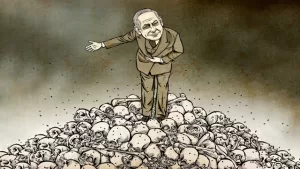[The motives behind US aggression towards Ethiopia have not been altogether clear. Is it simply that they lost their long standing puppet government led by the Tigray People’s Liberation Front? Competition with China? Or is it the regional Tripartite Agreement between Ethiopia, Eritrea, and Somalia , which poses too much independence from US global hegemony? Ethiopia borders both Eritrea and Somalia, and Eritrea has made its Red Sea ports available to Ethiopia since leaders of the two countries negotiated peace in 2018. Together, Eritrea and Somalia share a combined coastline of 2,672 miles in one of the most strategic corners of the world, on the Suez Canal, the Red Sea, the Bab al-Mandeb Strait, the Gulf of Aden, the Arabian Sea, and the Indian Ocean. I spoke to Eritrean American doctor and activist Simon Tesfamariam, co-founder of the #NoMore Movement to end neocolonialism in Africa.]
Ann Garrison: Simon, do you think that separating Ethiopia and Eritrea is the primary motivation behind US aggression towards Ethiopia?
Simon Tesfamariam: Absolutely. Think about what’s been going on over this past year. They’ve been doing their best to separate Eritrea and Ethiopia, to isolate Eritrea, and to break the resistance to imperialism in the region.
Eritrea has long been a bastion of resistance against imperialism. I believe that US policymakers think they can win over Ethiopians and win over the Ethiopian government and pry it away from Eritrea. Same thing with Somalia. These are the old divide-and-rule tactics that were used during the colonial era. That’s what they’re looking to do in the Horn of Africa again.
AG: Tell us why the US is so hostile to Eritrea.
ST: Well, back in the ‘90s, when Eritrea gained its independence, US policymakers went along with it for a while, thinking that Eritrea would essentially play ball, that it would take part in their neoliberal machinations, that it would do their bidding and, despite its leftist stance, maintain their interests in the region.
It didn’t take long for them to realize that Eritrea had a truly self-reliant policy. When the World Bank or the IMF would come to Eritrea and try to design its development programs, Eritrea would say, “No, we have our own programs. Thanks but no thanks. We’re going to do this our way.”
That type of mentality was not common in Africa at that time, and for a nation to come in and say, “We want to do it our way”—moving toward self reliance—that was seen as a threat by Washington. And so US policymakers sent in the Tigrayan People’s Liberation Front , or TPLF, as an attack dog against the ruling party in Eritrea, the People’s Front for Democracy and Justice . And basically, it was a regime change war. They wanted to take over the country and crush its sovereignty, because they felt that Eritrea was too independent of US global hegemony.
In Ethiopia, during the 27 years of TPLF rule, US policymakers had a willing puppet in a client state, and their goal was always to take Eritrea out. Now, despite the failure of decades of US proxy war against Eritrea, they continue to act as though they have no other choice, and they do indeed have no other choice within the logic of empire.
So they’re going to continue to try to pry Ethiopia apart from Eritrea. They want to pry the entire region apart from Eritrea. This is an imperial absolute for them, but the strong people-to- people relationship between the Eritreans, Ethiopians, and Somalis at this moment is going to make that impossible.
AG: Okay, as I understand it, Eritrea has taken no IMF or World Bank loans since its independence, and it doesn’t get foreign aid from the West. Nevertheless, it’s the only country in Africa that’s been able to meet the UN’s Millennium Development Goals on education and health care. Is that true?
ST: That’s correct. And it did that at a time when it was under sanctions, when you couldn’t get basic medicines, you couldn’t get ambulances, you couldn’t get servers for electronic medical record systems. So it was challenged from every corner, but it was still able to achieve the Millennium Development Goals for health and education. I think that’s a story in itself that needs to be told.
Eritrea is also one of the first countries in the world to get rid of USAID . Most people know that Cuba, Russia, and other countries expelled USAID from their borders, but few know that Eritrea did the same in 2005 or 2006. They got rid of USAID to stop all their covert operations to undermine national unity and sovereignty.
Similarly, like you said, they didn’t take handouts or IMF or World Bank loans, which they saw as crippling tools of empire. It’s not that Eritrea’s opposed to assistance from outside nations, but it didn’t want the strings attached to aid coming from USAID.
Again, Eritrea has a very independent policy, and has always strived for self-reliance. This is why it sees so much hostility from the United States.
AG: What’s the potential in the alliance between Eritrea, Ethiopia, and Somalia?
ST: There’s huge potential in solidarity across Africa, like what we saw back in the ‘60s with the rise of Pan-Africanism and the anti-colonial liberation movements that brought many African countries together. The alliance of these three countries bordering one another in the Horn of Africa was formalized in the Joint Declaration on Comprehensive Cooperation Between Ethiopia, Somalia and Eritrea , also known as the Tripartite Agreement, and it will now be very difficult for the West to break, hard as they’re trying.
The key thing to understand here is the strong people-to-people relationships going on. Somalis, Eritreans, and Ethiopians are now having discussions online and in the streets, getting together and mobilizing on the streets. You have the people of the Horn of Africa at home, the governments at home, and the diasporas all connected, moving towards this common destiny.
AG: And your own online activism, particularly with the #NoMore Movement, has been so threatening to entrenched power that you’ve been banned from Twitter, right?
ST: That is correct, unfortunately, so has Horn of Africa Hub, New Africa Institute, and other accounts. My personal and professional accounts have both been shut down, and so have any organizational accounts that I had access to. The same has happened to other people within my circle.
Individual accounts of some #NoMore leaders are still up, but how long before they get taken down?
AG: Okay, and just to make sure that we’ve got this covered, the #NoMore Movement is a movement to end neocolonialism in Africa, particularly focused on the Horn but with Pan-African goals, right?
ST: Yes, but it keeps expanding. We hope to see it become a global movement with African origins. We’re saying no to tools of exploitation—disinformation, division, and war—to move towards collective prosperity across the world. But we can’t forget that #NoMore originated in the Horn of Africa.
AG: Ethiopia and Eritrea were at war for nearly two decades, until Prime Minister Abiy Ahmed came to power and negotiated peace. Since then the two nations and peoples seem very closely bonded, and the diasporas who support Ethiopian Prime Minister Abiy Ahmed and President Isaias Afwerki rally against US intervention together. Do you think the Ethiopia/Eritrea war, which was really the TPLF/Eritrea war, is over going forward?
ST: US policymakers will make every effort to shatter the peace, but as I said earlier, there are now special relationships growing in the Horn of Africa, and it’s not just governments; its entire peoples. The nations, the governments, and the diasporas are all connected at this moment. They feel as though they share a kind of destiny. So if one leader decides to go off and do their own thing, and maybe go in a different direction, the people are going to say #NoMore to that too.
(Simon Tesfamariam is an Eritrean American medical doctor and writer living in New York City with a long history of organizing and activism within the global Eritrean community. He has lived, worked, and taught in Eritrea, volunteering in Eritrean hospitals and lecturing at the University of Asmara. Ann Garrison is a Black Agenda Report Contributing Editor based in the San Francisco Bay Area. In 2014, she received the Victoire Ingabire Umuhoza Democracy and Peace Prize for promoting peace through her reporting on conflict in the African Great Lakes Region. Courtesy: Black Agenda Report, a US socialist newsportal reflecting the views of the Black left.)




